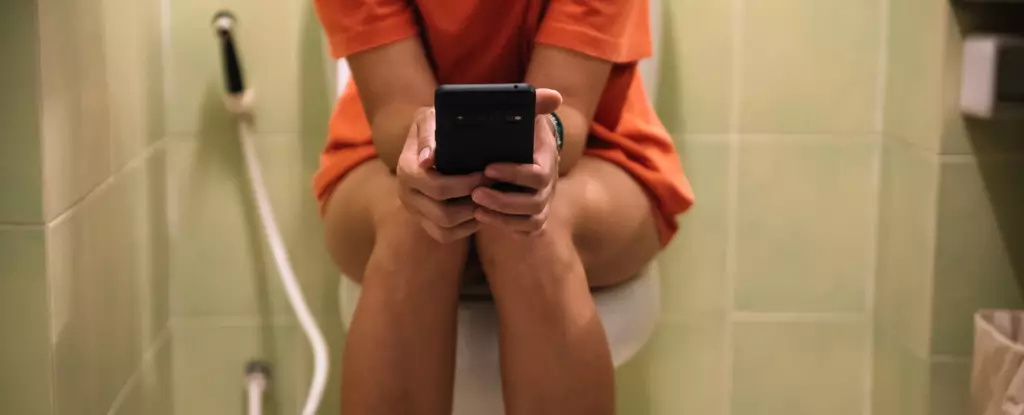In an age where information is at our fingertips, it’s tempting to carry our smartphones everywhere—even to the bathroom. While it may seem harmless to scroll through social media or catch up on the news while sitting on the porcelain throne, recent studies have raised serious questions about this common practice. According to a survey presented at the Digestive Diseases Week (DDW) conference, users who scroll their phones during long bathroom sessions are at a startlingly heightened risk for developing hemorrhoids, with an alarming 46 percent increase. This alarming figure should make every smartphone user reconsider their bathroom habits and perhaps even rethink the very nature of their ‘restroom retreats’.
The Hidden Dangers of Extended Bathroom Breaks
Let’s dissect what happens when we allow our devices to hijack our time on the toilet. Extended periods spent sitting while engrossed in our screens can lead to physical issues, with hemorrhoids being the most glaring. The survey followed 125 participants who were undergoing colonoscopies, revealing a not-so-shocking correlation between lengthy toilet use and swelling in the lower rectum. What’s striking is that demographic factors such as age, body mass, and exercise habits didn’t seem to influence the results. This means that the risk is broadly applicable across social divides, making the issue a universal one rather than a niche embarrassment.
It’s essential to address the phenomenon of “toilet scrolling,” which emphasizes how our connection to devices takes precedence over physical health. After all, spending more than six minutes on the toilet—often fueled by captivating content—usurps time that could be better spent tending to our bodily needs. Doctors advise limiting toilet time to ten minutes at most, and some even suggest a strict three-minute rule. Yet, how many of us have found ourselves engrossed in a viral meme or an intriguing article, blissfully ignorant of what’s happening to our bodies?
Historical Perspectives: An Old Problem in a New Context
Interestingly, reading while using the toilet is not a modern invention. Historically, people amused themselves with newspapers during such private moments. However, smartphones have transformed our relationship with this ritual, turning what was once a simple task into an extended session of passive consumption. The digital age has rendered the experience more engrossing and, paradoxically, more harmful.
The historical context provides a revealing insight into the evolution of our behaviors. In the past, people may have opted for simple reading material; today, we have entertainment curated to keep us hooked. With a steadily escalating daily workload, the bathroom has become an easy escape for those of us seeking “me-time.” However, we must re-evaluate this naïve indulgence in light of the mounting evidence which suggests that our modern conveniences come at a very real cost.
The Medical Community’s Response: Time for Action
The medical community remains cautiously optimistic about reaching a consensus on how to handle this burgeoning issue. With nearly four million doctor visits in the U.S. each year related to hemorrhoids, the lack of modern research on this prevalent condition raises eyebrows. As the last significant study on hemorrhoids was conducted over three decades ago, there is an urgent demand for more thorough investigations into how our habits might foster such widespread ailments.
Experts agree: the bathroom should be a place both for business and for sanctuary, devoid of distractions. Researchers have posed the radical idea of making restrooms smartphone-free zones, asserting that this could radically improve our toilet hygiene and overall health. Removing phones from the equation might very well reduce bombarding notifications, allowing one to engage with this essential human process in a more mindful manner.
Beyond Hemorrhoids: The Importance of Digital Detox
While the threat of hemorrhoids looms large in this conversation, the implications extend far beyond our bathroom health. The lure of our devices can shroud our most basic needs and undermine crucial moments meant for self-care and awareness. As a society, we must ask ourselves whether scrolling through social media while defecating truly adds value to our lives or merely distracts us from the realities we face. In an era where the lines have blurred between personal time and incessant connectivity, the risks are easy to overlook.
Moreover, this toilet scrolling phenomenon may signify broader issues related to our reliance on technology. It serves as a microcosm of the struggles we appear to face in terms of engaging with ourselves and our bodies amidst constant external stimulation. Maybe it’s time for us to strike a balance between enjoying our digital worlds and respecting our physical health. Reducing time spent on the toilet while glued to screens may be one step towards reclaiming that balance.
As we navigate this digital landscape, it’s crucial to remember that while seeking a few moments of distraction in the bathroom may seem innocuous, the potential health consequences are anything but trivial. Perhaps the only thing we ought to prioritize when seated on the toilet is the health of our bodies, not our social media feeds.


Leave a Reply